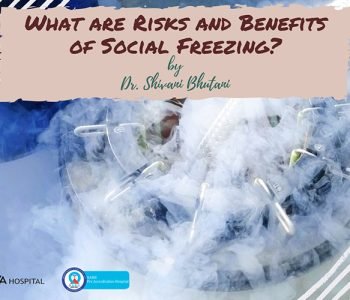 Eva Hospital
Eva Hospital
What are Risks and Benefits of Social Freezing?
You will be surprised to know that men produce new sperm almost throughout their life but women’s fertility graph is almost hill-shaped; it increases as they grow and begins to deteriorate after their 35th birthday tentatively.
The egg cell is important for female fertility.
A unique egg reserve starts to form in the body of a new baby girl. As the girl grows, the majority of eggs are wasted in the process of growth and degeneration (apoptosis).
By the time of puberty, only about 4, 00,000 eggs are left and roughly only 300-500 eggs qualify for ovulation in the fertile years.
The regular menstrual cycle does not coincide with fertility and another fact is that fertility may terminate much before menopause sets in. This gave rise to the concept of Social Freezing where the woman could freeze the eggs at the most fertile period of her life to be able to get pregnant later.
What is Social Freezing?
Social freezing is like a new ray of hope for women who want to get pregnant. Women can lengthen their fertility period by getting the eggs (oocytes) frozen at the right age and time.
Fertility preservation or social freezing is gaining popularity as people are delaying childbirth for various inevitable and important reasons.
The oocytes or eggs are extracted, frozen, and stored. The women can choose to get the eggs thawed, fertilized and transferred to the uterus to get pregnant at any point in time in the future.
How does Social Freezing Happen?
Eggs (oocytes) are frozen using either a controlled rate (slow-cooling method) or the latest flash-freezing method called Vitrification. Vitrification is much faster but requires a high amount of cryoprotectants.
Also, vitrification has increased oocytes’ survival post-thaw and marked a significant improvement in pregnancy rates with social freezing.
The doctor first examines the ovarian reserve and the functioning of the woman’s ovaries. The process of retrieving and freezing the eggs takes about two weeks including hormone treatment and egg retrieval.
What are the Benefits of Social Freezing?
Egg freezing is a process carried on for more than three decades now. Social freezing is a boon for women who wish to get pregnant after 38 years of age. Following are the benefits of social freezing:
- Pregnancy at Any Age
Social freezing has made pregnancy possible at an advanced age and avails the joys of parenting even after the 40s.
- High Chances of Healthy Children
Social freezing reduces the chance of having children with chromosomal abnormalities considerably.
Egg freezing is considered a better and safer option than embryo freezing on social and moral grounds.
Who should opt for Social Freezing?
Women at all age groups prefer social freezing on account of the following important and unavoidable reasons:
- Cancer Treatments
Women who have to face chemotherapies or cancer treatments prefer social freezing as the strong radiations tend to damage ovaries and the chances of healthy pregnancy go down.
- Endometriosis
Women with severe endometriosis or any other autoimmune diseases opt for social freezing increasingly to be able to parent a child smoothly. Women with endometriosis prefer IVF for conception and pregnancy.
- Pregnancy when prepared mentally
Work pressures, family stability, income status, or a rising career graph are some reasons when women tend to postpone family planning and having a baby. Social freezing gives them a chance to utilize their fertile eggs to get pregnant at any point in their lives when they are ready.
- Suitable Partner
Sometimes women are unable to find a suitable partner and postpone the decision of having their own genetic baby till they find a suitable partner. Social freezing helps them to have their own baby when they are comfortable with a suitable partner.
What are the Risks of Social Freezing?
The best gynecologist and fertility expert of Punjab, Dr. Shivani Bhutani, EVA Hospital, states that the risks of social freezing are almost negligible.
Only one out of four women may report insignificant side-effects with social freezing.
There may be hormonal fluctuations temporarily with the medications and routine PMS-like symptoms such as mood swings, insomnia, headaches, or bloating.
Dr.Bhutani says that the side effects last only about 8-10 days till the time the medicines are injected. An experienced doctor will apprise you of the situation and make you comfortable.
Conclusion
With the scientific developments and technological advancements, social freezing has seen an upsurge in the process of postponing baby-making.
The success rates are high under the aegis of an experienced doctor like Dr. Shivani who is well-equipped with the best state-of-art facility to conserve and preserve eggs.
For more details or queries on social freezing, seek an appointment with Dr. Shivani and avail the benefits of social freezing at the right age.